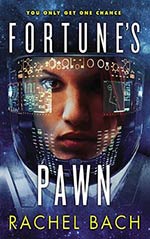
![]() thrak
thrak
9/2/2014
![]()
"Whole truths usually just made things worse anyway. I avoided them whenever I could."
'Fortune's Pawn' by Rachel Bach is something of a missed opportunity. On the one hand, you have a well drawn female protagonist who not only kicks ass but is realistically flawed successfully inhabiting a genre archetype usually reserved for males, a bunch of interesting aliens and a brisk, page-turner-y plot. On the other hand, you have a plot so riddled with cliches that the book as a whole struggles to carve out its own identity outside of its well-worn source materials. This is a pity as there are the seeds of a very good book in 'Fortune's Pawn' struggling to make itself heard over tired space-opera trappings.
'Fortune's Pawn' tells the story of Devi Morris, a shoot-first, ask-questions-later mercenary kitted out with power armour, laser swords and guns. Hoping to fast-track her career, she follows a tip and takes up a tour of duty as a guard on board the Glorious Fool, a ship with luck so bad as to be legendary. Is the crew a rag-tag bunch of misfits? Do the captain and the ship have a dark secret that they're determined to make sure Devi doesn't find out? Is there a handsome and mysterious love interest with a plot-based reason why he and Devi can't be together? If you answered yes to all three questions, pat yourself on the back and help yourself to a biscuit. All of this stuff is good fun, and these are elements that have become cliches in space operas for a reason, and they're certainly not done badly here, but everything feels second hand at best. The influence of TV space operas Firefly and Farscape figure strongly here, as well as, say, Heinlein's 'Starship Troopers' or Haldeman's 'The Forever War', though with significantly less philosophical heft than either. And while Rachel Bach clearly has good taste and a firm understanding of what makes these sources of inspiration so beloved, she brings precious little new to the table. This isn't the worst sin in the world to be guilty of, but it says something about how deeply indebted to the past your work is when you can comfortably reduce any given scene to, "Oh, I really enjoyed the bit where Aeryn Sun fought the Dunwich Horror until River Tam came in and rescued her."
This is a shame, because there are things that 'Fortune's Pawn' does particularly well. Devi Morris is a very successful gender-flip of the standard male meathead mercenary you usually get in these stories. Not just a female character who is strong, Devi is believably flawed - she's impulsive, reckless and bigoted. Likewise her romance with Rupert, Mr. Handsome and Mysterious, is very well handled, for all the predictability of its arc. The two have a natural chemistry and rapport and clearly enjoy each other's company. What's more, Devi refuses to be patronised or rescued by him, or have him make big decisions about their relationship without her input.
In some ways, 'Fortune's Pawn' suffers being read after 'Ancillary Justice'. Devi's world of Paradox is a technologically advanced feudal society. This is an amusing conceit and a nice comment on the imperialism prevalent in much space opera, and there's clearly a lot of potential for witty subversion here, however I felt this was not used to the extent it could have been. Additionally, Rachel Bach has some really interesting aliens that I would far rather have spent more time with than sitting through another shoot out. The xith'cal are basically space dinosaurs (think halfway between Scarrans and the Jem'Hadar) who can choose their biological sex, with the males being the hunters but also butchers and cooks, and the females being engineers and scientists, or, in the case of Hyrek, the ship's doctor on the Glorious Fool, they can just choose not to differentiate. Hyrek was by far my favourite character and I would easily have read a whole novel about gender queer book snob space dinosaurs. But I digress, one must review the book at hand and not the book you wanted it to be. The point is that there is some actual original invention here, that could have been used to explore themes of gender and identity, which were sadly overlooked to provide a simpler, action-heavy but idea-lacking plot.
In many ways I think this is the crux of my problem with the book; even after I finished it it still didn't feel like it had been about anything. There's nothing wrong with a bit of action-packed fun, but there's no reason that action-packed fun can't make us think a little as well once all the smoke's cleared. While I found some of the ideas in the book very promising, and I thought that Bach's execution of a female version of a traditionally male archetype was very well done, overall the book left me cold. I am willing to admit that I may be doing Rachel Bach a huge disservice, seeing as 'Fortune's Pawn' is very much conceived as part one of a trilogy. Perhaps books two and three explore the subtle themes of book one in more depth. (Perhaps it makes more sense of the abrupt and frankly bizarre mindwipe decision at the end of the book). However my experience reading 'Fortune's Pawn' has not inclined me to rush out to the shops to buy the sequels, so I may never know what I'm missing.
http://goldenapplesofthewest.blogspot.co.uk/2014/09/rachel-bach-paradox-book-one-fortunes.html